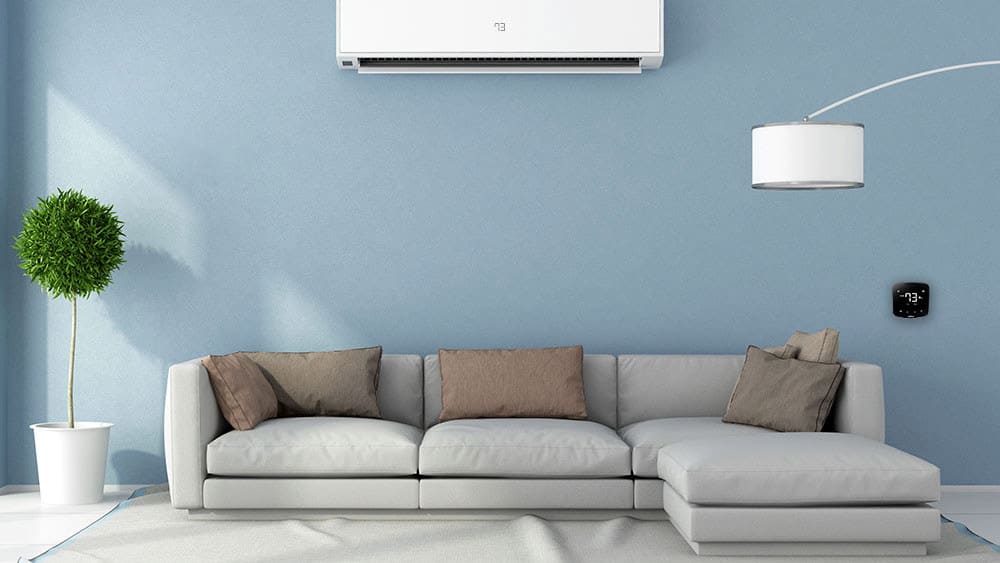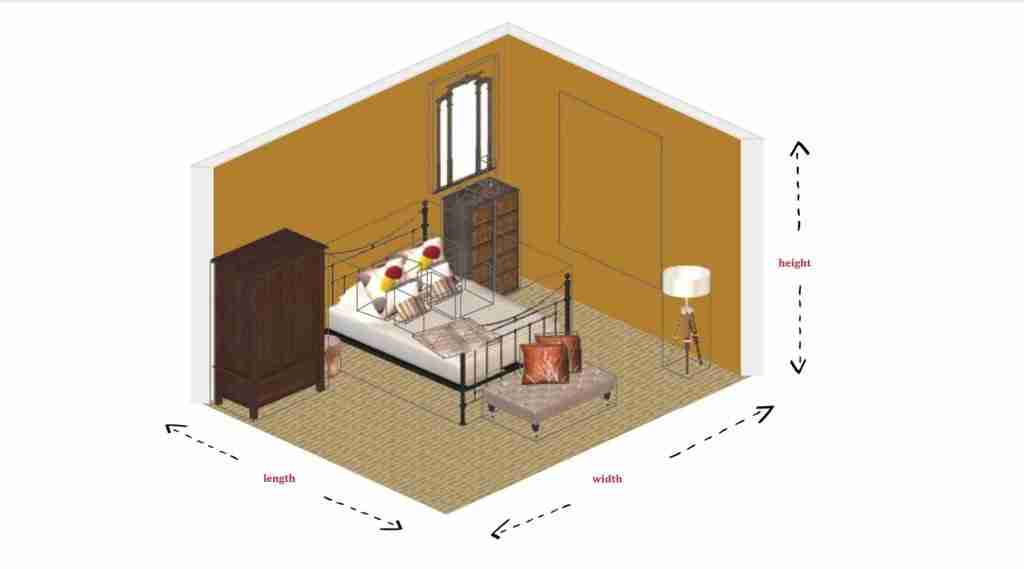An accurate and concise answer to the Air Conditioner Room Size Calculator is to use online calculators or formulas that estimate the number of BTUs needed based on the size and insulation of the room. When it comes to choosing the right size air conditioner for your room, it is important to consider factors such as the size of the room and the insulation.
A properly sized air conditioner ensures optimal cooling and energy efficiency. But how do you determine the right size for your room? Luckily, there are online calculators and formulas available that can help you accurately calculate the required BTUs (British Thermal Units) for your room.
By inputting the dimensions and insulation information, these calculators estimate the capacity or tonnage needed for your air conditioner. We will explore different resources and methods to calculate the appropriate size of an air conditioner for your room without the need for complex calculations or formulas.
Ac Sizing Simplified
Understanding Air Conditioning Basics
Before calculating the cooling needs of your room, it’s important to have a basic understanding of how air conditioning works. Air conditioners are designed to remove heat and humidity from a room, creating a comfortable indoor environment. They do this by circulating refrigerant through coils, absorbing heat from the indoor air and venting it outside. The cooled air is then pushed back into the room, providing relief from the hot and sticky weather.
Calculating Cooling Needs
To determine the appropriate size of an air conditioner for your room, you need to calculate its cooling needs. This involves considering factors such as the room size, insulation, number of occupants, sun exposure, and the area’s climate. The calculation is typically done in British Thermal Units (BTUs). One BTU represents the amount of energy needed to cool or heat one pound of water by one degree Fahrenheit.
To simplify this process for you, there are numerous AC sizing calculators available online. These calculators take into account the various factors mentioned earlier and provide you with an estimate of the BTUs required to cool your specific room. Some calculators even provide recommendations on the appropriate tonnage for your air conditioner.
Factors Affecting Ac Size
Several factors can affect the size of the air conditioner you need. These include:
- Room size: Larger rooms require more cooling power than smaller ones. The square footage of the room is a critical factor in determining the required BTUs.
- Insulation: Well-insulated rooms retain cool air better, reducing the load on the air conditioner. The level of insulation in your room should be considered when calculating the cooling needs.
- Number of occupants: The number of people in a room can contribute to the amount of heat generated. More occupants mean a higher cooling load.
- Sun exposure: Rooms that receive direct sunlight will heat up faster, requiring more cooling power to maintain a comfortable temperature.
- Climate: The climate of your area plays a vital role in determining the required size of the air conditioner. Hotter climates may require larger units to cope with the increased heat load.
By considering these factors and using an AC sizing calculator, you can simplify the process of finding the right size air conditioner for your room. Avoid the hassle of guesswork and ensure optimal cooling efficiency for a comfortable environment.
Using An Air Conditioner Room Size Calculator
An air conditioner is an essential appliance for keeping your indoor space cool and comfortable, particularly during hot summer months. However, choosing the right size air conditioner for your room is crucial to ensure optimal cooling efficiency and energy savings. This is where an air conditioner room size calculator comes in handy. Using an air conditioner room size calculator helps you determine the appropriate cooling capacity required for your specific room size, taking into account various factors such as room dimensions, insulation, and other variables.
Importance Of Accurate Measurements
Before using an air conditioner room size calculator, it is important to understand why accurate measurements are essential in determining the appropriate cooling capacity for your room. Here’s why:
- Efficiency: An undersized air conditioner will struggle to cool a larger room, leading to increased energy consumption and inadequate cooling. On the other hand, an oversized air conditioner will cycle on and off frequently, resulting in inefficient cooling and higher electricity bills.
- Comfort: A properly sized air conditioner ensures even cooling throughout the room, minimizing hot or cold spots and providing optimal comfort.
- Energy Savings: Choosing the right size air conditioner helps you save energy by avoiding unnecessary energy wastage through inefficient cooling or excessive cooling capacity.
Step-by-step Calculation Process
Now let’s walk through the step-by-step process of using an air conditioner room size calculator:
- Measure the Room: Start by measuring the length and width of the room in feet or meters. Multiply these two measurements to calculate the room’s square footage or area.
- Consider Insulation: Take into account the level of insulation in your room. Poor insulation may require a higher cooling capacity, while well-insulated rooms may need a lower cooling capacity.
- Check Ceiling Height: Determine the height of the ceiling in the room. Higher ceilings may require additional cooling capacity.
- Use the Calculator: Enter the measured room area, insulation level, ceiling height, and any other relevant details into the air conditioner room size calculator.
- Review the Results: The calculator will provide you with the recommended cooling capacity, represented in British Thermal Units (BTUs) or tons. This information will help you choose the right size air conditioner for your room.
By following these steps and utilizing an air conditioner room size calculator, you can be confident in selecting the most suitable air conditioner to efficiently cool your room and create a comfortable living environment.
Room Measurements Role
Calculate the size of your air conditioner with the help of our air conditioner room size calculator. Simply measure the square footage of your room and find the right BTU and tonnage for optimal cooling efficiency. Say goodbye to guesswork and find the perfect air conditioning unit for your needs.
Gathering Correct Dimensions
When it comes to choosing the right air conditioner for your room, accurate measurements play a critical role. Gathering correct dimensions is the first step in determining the appropriate size of the AC unit required to provide optimal cooling. By following a few simple steps, you can ensure that your room’s measurements are accurate and reliable.
- Measure the Length and Width: Using a measuring tape, measure the length and width of your room in feet. Make sure to take precise measurements from wall-to-wall, accounting for any irregularities such as alcoves or bay windows.
- Calculate the Square Footage: Multiply the length by the width to obtain the square footage of your room. For example, if your room is 12 feet long and 10 feet wide, the square footage would be 120 square feet.
- Take Ceiling Height into Account: Note the height of your room’s ceiling, as it also plays a role in determining the cooling capacity required. Standard ceiling heights are usually around 8 to 9 feet, but if your room has a higher or lower ceiling, it can impact the AC size calculations.
By gathering these correct dimensions, you can move on to the next important factor: the impact of room shape and size on air conditioning requirements.
Impact Of Room Shape And Size
The shape and size of your room have a significant influence on the cooling capacity needed for efficient air conditioning. Room shape affects the way air circulates and the extent to which hot spots are created. Additionally, the size of the room determines the BTU (British Thermal Unit) requirement and the appropriate tonnage for the AC unit.
Rooms with irregular shapes or obstructions such as furniture, partitions, or columns may experience reduced airflow, leading to inadequate cooling. On the other hand, larger rooms typically require higher BTU ratings to ensure proper temperature control.
Therefore, it is crucial to consider both the shape and size of your room when calculating the AC capacity. Taking all these factors into account will help you accurately determine the right air conditioner size, resulting in effective and energy-efficient cooling for your space.
Tailoring Ac Capacity To Room Volume
Choosing the right air conditioner capacity for your room is essential to ensure optimal cooling and energy efficiency. By considering factors such as square footage, ceiling height, and thermal needs, you can easily determine the appropriate BTU (British Thermal Unit) per hour rating for your AC. Let’s explore these factors in detail:
Square Footage To Btu/hour Conversion
Measuring the square footage of your room is the first step in determining the BTU/Hour capacity required for effective cooling. Use the following table to convert your room’s square footage to the appropriate BTU rating:
| Room Size (Square Footage) | BTU/Hour Rating |
|---|---|
| 100-250 sq. ft. | 5,000-6,000 BTU/Hr |
| 250-400 sq. ft. | 7,000-9,000 BTU/Hr |
| 400-650 sq. ft. | 10,000-12,000 BTU/Hr |
| 650-1,000 sq. ft. | 13,000-15,000 BTU/Hr |
Ceiling Height And Thermal Needs
Consider the height of your room’s ceiling and any specific thermal needs when determining the AC capacity. Rooms with higher ceilings require additional cooling power due to increased volume. Additionally, factors such as insulation, location (e.g., sunny or shaded area), and the number of occupants can impact the thermal needs of the room. It is advisable to consult with a professional to ensure accurate calculations.
By tailoring your AC capacity to your room’s volume, you can enjoy optimal cooling comfort and energy efficiency. Remember to factor in the square footage, ceiling height, and any specific thermal needs to determine the appropriate BTU/Hour rating for your air conditioner.
Supplementary Factors Consideration
When it comes to determining the appropriate size for your air conditioner, there are a few supplementary factors that you should consider. These factors can greatly impact the efficiency and effectiveness of your cooling system. In this section, we will discuss two important factors to keep in mind: insulation quality and material impact, as well as window orientation and natural light.
Insulation Quality And Material Impact
Insulation plays a crucial role in maintaining the desired temperature inside your room. It acts as a barrier against the outdoor elements, preventing heat from entering during the summer and escaping during the winter. The quality of insulation can vary greatly depending on the material used and its thickness. It is important to assess the insulation condition of your room before determining the size of your air conditioner.
An insulated room with high-quality materials will require a smaller cooling capacity as it can trap and maintain the cool air effectively. On the other hand, a poorly insulated room will allow heat to seep in, requiring a larger cooling capacity to achieve the desired temperature. Therefore, it is essential to evaluate the insulation quality and material impact when selecting the appropriate size for your air conditioner.
Window Orientation And Natural Light
The orientation of your windows and the amount of natural light that enters your room can significantly influence the cooling requirements. Windows that face the sun for long periods can allow excessive heat to enter, increasing the workload on your air conditioner. On the other hand, windows that are shaded or facing away from direct sunlight will require less cooling capacity.
When calculating the size of your air conditioner, take into account the orientation of your windows and the amount of natural light they receive. If your windows are exposed to direct sunlight, it is recommended to opt for a slightly larger capacity air conditioner to compensate for the additional heat load. Conversely, if your windows are shaded or don’t receive direct sunlight, a smaller capacity air conditioner may suffice.
In conclusion, when determining the size of your air conditioner, it is crucial to consider supplementary factors such as insulation quality and material impact, as well as window orientation and natural light. By taking these factors into account, you can ensure that your air conditioner is appropriately sized for your room, maximizing efficiency and comfort.

Credit: cielowigle.com
Choosing The Perfect Ac Unit
When it comes to finding the right air conditioner for your space, it’s essential to consider various factors to ensure optimal comfort and energy efficiency. One of the key aspects to consider is the size of the room, as this directly impacts the cooling capacity required. To help you choose the perfect AC unit, we’ve put together some useful guidelines and tips to keep in mind.
Balancing Power With Efficiency
When selecting an air conditioner, it’s crucial to strike a balance between power and efficiency. A unit that is too powerful for your space will not only consume more energy but also lead to inconsistent cooling and increased humidity levels. On the other hand, an undersized unit will struggle to cool the room adequately, resulting in continuous operation and skyrocketing energy bills.
To find the right power output for your room, you can utilize an air conditioner room size calculator. These calculators take into account factors such as room dimensions, insulation level, and the number of occupants to determine the appropriate cooling capacity in terms of BTUs (British Thermal Units).
Final Checks Before Purchase
Before making a final decision, there are a few additional factors to consider. Firstly, it’s important to check the Energy Efficiency Ratio (EER) or Seasonal Energy Efficiency Ratio (SEER) of the air conditioner. The higher the EER or SEER rating, the more energy-efficient the unit is, saving you money in the long run.
| Factor | Considerations |
|---|---|
| Room Insulation | Poor insulation may require a higher cooling capacity. |
| Climate | Hotter climates may require a higher cooling capacity. |
| Number of Windows | Rooms with more windows may require additional cooling. |
| Occupancy | Rooms with more occupants may require higher cooling capacity. |
Additionally, consider the noise level of the unit. A quiet operation is crucial, especially for bedrooms or spaces where minimal noise is preferred. Look for AC units that have a low decibel (dB) range.
Lastly, check for the warranty offered by the manufacturer. A reliable warranty ensures peace of mind and protects your investment.
By following these guidelines and considering the specific factors of your space, you can confidently choose the perfect AC unit that meets your needs for power, efficiency, and overall comfort.
Frequently Asked Questions On Air Conditioner Room Size Calculator
How Do I Calculate What Size Air Conditioner I Need?
To calculate the size of air conditioner you need, multiply the length and width of the room. The resulting number is the British Thermal Units (BTUs) required to cool the space effectively. For a more accurate estimate, consult with a local HVAC professional.
How Many Btu Do I Need For A 12×15 Room?
For a 12×15 room, you would need approximately 18,000 BTU to adequately cool the space.
How Do You Calculate Ac Capacity For A Room?
To calculate AC capacity for a room, multiply the length and width of the room to determine the square footage. Then, use a BTU calculator or consult with a HVAC professional to determine the appropriate size air conditioner needed for the square footage of the room.
What Size Ac Unit Do I Need For A 20×20 Room?
For a 20×20 room, you will need an AC unit that can cool around 4,000-5,000 BTUs. Calculate the room’s area by multiplying its length by its width to get the approximate size you need.
Conclusion
To find the perfect air conditioner size for your room, it is crucial to consider factors such as the room’s square footage, insulation, and ceiling height. Using an air conditioner room size calculator, like the ones provided by reputable sources, can greatly simplify this process.
By accurately assessing your cooling needs, you can ensure optimal comfort and energy efficiency. So, take advantage of these handy calculators and find the right air conditioner size for your space without the need for complex calculations or formulas.

I am a Generator & Calculator And Drone specialist writer and blogger based in the USA & UK. I have been working with Generator & Calculator for 4 long years. And I give trips on various Generator & Calculator problems and solutions. I have a lot of experience with Generator & Calculator And I share them here

